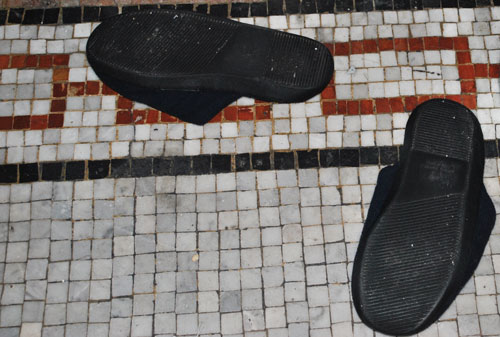Essay: “Left Behind”
by Maxine Case / January 26, 2012 / No comments
South African writer Maxine Case made her first print appearance in the collection African Compass: New Writing from Southern Africa with the story “Homing Pigeons.” In 2007 her debut novel All We Have Left Unsaid won the Commonwealth Writers’ Prize for Best First Book, Africa region and was the joint winner of the Herman Charles Bosman Prize.
In 2010, after a fellowship at the University of Iowa’s International Writing Program (2009), Case spent three months in Pittsburgh as a City of Asylum/Pittsburgh guest writer-in-residence. She currently lives in New York City and is pursuing her master’s degree in Fine Arts via a fellowship from the New School University.
This month Sampsonia Way asked Case for some of her unpublished work. She responded with two essays, one of which is presented below.
“Left Behind” is a condensed memoir full of the observations, idiosyncrasies, and fears of an immigrant living in New York without a definite future. In Case’s clear, subtle voice, these characterizations transcend the “immigrant” and reach for the universal, yet remain deeply rooted in reality.
“Left Behind” is a Sampsonia Way Exclusive.
Left Behind
The sign above the table reads: “Free! Help yourself (smiley face).” On the table—battered, brown wood covered with a cheap white cloth of alternating matte and shiny stripes—a motley selection of possessions artfully arranged. The table is in the cavernous lobby of my West Harlem apartment building. At night the lobby has the faded glory of an abandoned ballroom; the overhead lights are dim and the pattern of the mosaic tiles is obscured by cracks and a patina of grime.
Since moving into the building in May, 2011, I’ve noticed many such displays, although the table is a first. The offered objects range from useful to junk; essential to nonessential. How do the owners decide what they take with them and what to leave behind? So far, the threat of bedbugs, and an upbringing that eschews collecting other people’s castoffs means that I have resisted appropriating anything for myself.
Still, the toaster gives me pause—the white Silex toaster thoughtfully placed in its box. I need a toaster; I currently toast bread in the oven. When I first moved here, I had more urgent needs than a toaster. I make do. The toaster remains in the lobby. The next time I pass, it is gone.
Likewise, the two vases from which spears of green foliage spill and wilt, draws my attention. The vases contain no water, so I guess that they are merely decorative; festooning the table as if for an uncommon dinner party. One of the vases is chipped, but the other is perfectly alright. I could use another vase, but still I resist. My one vase—a one dollar Goodwill purchase—currently holds a rooted peace lily salvaged from a fallen shoot at my previous apartment, which I shared with two housemates. When I first moved it here, it had one or two roots. Now its root system is profuse, crowding the base of the vase. Perhaps one day I will buy a pot and soil, thus freeing my vase for its original purpose, but for now, the lily remains in residential limbo.
Days pass and the items are slowly swooped up, watched only by a plaster of Paris angel, precariously perched on the ledge formed by the tops of our mailboxes. On either side of the angel, desiccated carnations stand stiffly in glass tumblers. I am not sure who empties and replaces the flowers or why they are there.
Soon, all that remain are a pair of backless men’s slippers, navy blue, size eleven or twelve—the material napped in places. They could not be described as gently worn. Who would possibly want to slide his bare feet into another man’s slippers? Why had the owner not thrown them away? And if he could not bring himself to throw them in the trash, why hadn’t he recycled them instead? After all, the recycling bins are directly opposite the table.
Until recently, a large black suitcase lived at the foot of my bed. It was less than a suitcase than a jumped up duffel bag with wheels. Usually, clothes tangled out of it, irritating me. The suitcase / duffel bag did not belong to me, but to my younger sister, who had been staying with me for a few months. She came to New York to visit, and soon began talking about finding a job, getting the proper visa and eventually moving into her own apartment. My sister was a hotshot economist in Johannesburg, earning a fat banker’s salary before she quit her job. In New York she was just another would-be immigrant and American banks were not hiring. She left a few days before her visitor’s visa expired, her American dream come to naught.
I wonder whether my own return will echo hers at the end of May when my fellowship ends and my visa expires. I love my life in New York and too have begun to talk about staying. This building is one populated largely by immigrants from other cities or towns in America and different parts of the world. Like my sister and I, many of my neighbors are from Africa—a continent where resources are so strained that it would be unthinkable to throw away a pair of still-good slippers, just like I agonize about throwing away food. Some of us manage to stay, but the frequent displays in the lobby are a silent testimony that all too often, most of us do not.






